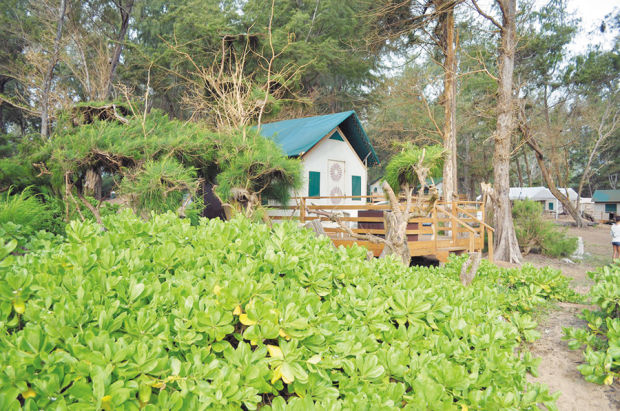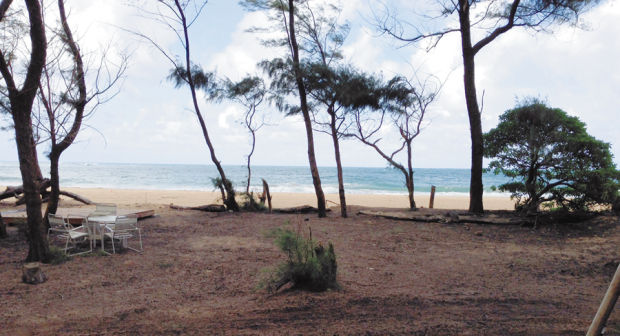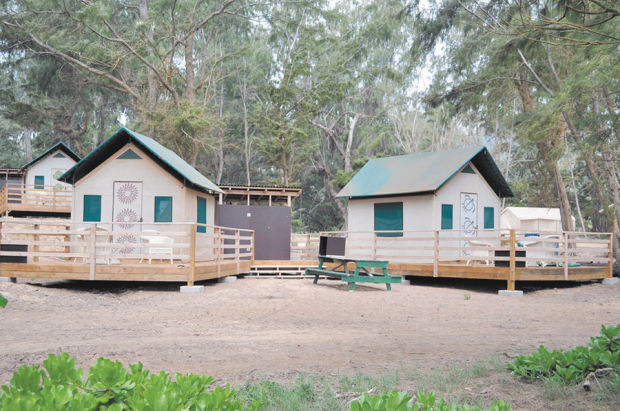LIHUE — A new nonprofit campground on eight acres of beach at Anahola Bay is open to the public. Developed by native Hawaiians from the Anahola Hawaiian Homes Association, Kumu Camp has been in the works since 2010, according to
LIHUE — A new nonprofit campground on eight acres of beach at Anahola Bay is open to the public.
Developed by native Hawaiians from the Anahola Hawaiian Homes Association, Kumu Camp has been in the works since 2010, according to a release Tuesday.
“We’ve been hosting youth groups since April of this year on a limited basis with our closest partners and on a word-of-mouth basis,” said Robin Danner, AHHA board member and camp manager. “Because it’s pretty much been an all-volunteer campground, with much of the work and manning of the campground by our homestead members, we haven’t felt comfortable until now in hosting campers.”
Since dreaming up the idea four years ago, AHHA has spent over $200,000, most of which came from donors and grants, according to Danner. The land was issued to AHHA by the Department of Hawaiian Home Lands in 2010.
“Most of the funding has been spent on materials, with almost all volunteers from the Hawaiian community doing the building and erecting of the tentalows and yurts on the property,” Danner said.
Founded in 1982, AHHA is one of more than 30 homestead associations controlled by native Hawaiians eligible for lands set aside by the U.S. Congress in 1920 to be held in trust, similar to Indian reservations, for native Hawaiian homesteading.
Kipukai Kualii, an AHHA board member, said the community project is the prototype of how DHHL and the Hawaiian Homes Commission should partner with homestead associations to collectively utilize homestead lands for direct beneficiary rehabilitation.
“It’s crucial now that DHHL and other government leaders allow local beneficiary organizations like ours this kind of direct access to and long-term use of our trust lands for the development of projects like Kumu Camp — whereby we’re able to empower ourselves and bring real economic and social value to our homesteads,” he said.
The Anahola Bay site features fully furnished “tentalows,” a cross between a tent and a bungalow, available year-round, along with hot water showers and bathroom facilities. There is also access to outdoor pavilions, various party tents, a yurt conference room, a mobile kitchen for large groups, beach volleyball, horse shoes, water sports, massage services, yoga classes and event catering from the nonprofit Anahola Cafe & Saimin Stand.
Kualii said the campground is great for youth or church groups, family outings or individual campers.
“I’m so proud of our Anahola Hawaiian Homes Association and thankful for the many volunteer hours put in,” he said. “Together, in Kumu Camp, we have created a one-of-a-kind gem, tucked amidst the ironwood and naupaka in the center of our bay where you can’t help but feel the soothing, even healing, mana of the sea breezes that blow through.”
To date, Kumu Camp has hosted the Young Women’s Christian Association, Kanuikapono Public Charter School, Ke Kula O Nawahiokalaniopuu School in Hilo, parent groups from Kalaheo and canoe clubs from Molokai and Oahu.
Danner said that while the opportunities offered at Kumu Camp are positive, the inspiration for the camp comes from a dark reality.
“That Hawaiian teens have one of the highest suicide rates, that our youth are challenged by drugs and staying in school,” she said. “We want our youth from Kauai to have access to the joy of camping on the beach, being mentored by elders, by our lands, to draw strength and renewal, to face down the challenges and lift up their opportunities.”
Danner said Hawaiian families from AHHA wanted to create a campground for families, youth, cultural practitioners and visitors to find renewal and laughter, as well as learn something new about Anahola and its people.
“For sure, Kumu Camp represents for us, as homestead families from Anahola, a place that we have kuleana for, that we can express our love for our lands, express our love for others on the island, and to express our appreciation to Ke Akua that we are still here,” she said. “I think Kumu Camp is special because it’s about us, doing for ourselves, and doing for others — a location that was meant to malama the soul.”
Nightly rates for individual and group campsites range from $20 to $40, depending on the time of year. Private tentalows, which sleep up to three people, start at $55 per night. Kamaaina, homestead and group discounts are available.
All camping fees will be used for upkeep of the campground and support for youth and cultural programs in the Anahola area.
For more information or to make a reservation, visit www.anaholabeachretreat.org, email info@anaholabeachretreat.org or call 631-9082.




